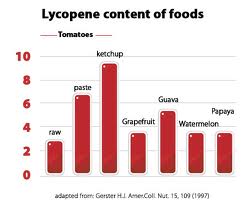Lycopene is present in all red fruits and vegetables, but its concentrations are highest in tomatoes.
It becomes more readily available and biologically active when it comes from processed tomatoes with a small amount of cooking oil added.
People who have diets rich in tomatoes, which contain lycopene, appear in some studies to have a lower risk of certain types of cancer, especially cancers of the prostate, lung, and stomach.
Tomatoes are the most concentrated food source of lycopene, although apricots, guava, watermelon, papaya, and pink grapefruit are also significant sources.
Studies that looked at lycopene levels in the blood found that levels were higher after people ate cooked tomatoes than after they ate raw tomatoes or drank tomato juice.
This suggests that lycopene in cooked tomato products such as tomato sauce or paste may be more readily absorbed by the body than lycopene in raw tomatoes.
Eating lycopene-rich vegetables and fruits together with a small amount of oil or fat (for example, salad oil or cheese on pizza) increases the amount of lycopene absorbed by the intestines.
Dr. Mridula Chopra and colleagues at the University of Portsmouth tested the effect of the nutrient lycopene on the simple mechanism through which cancer cells hijack a body’s healthy blood supply to grow and spread.
They found that lycopene, which is what gives tomatoes their red color, intercepts cancer’s ability to make the connections it needs to attach to a healthy blood supply.
The research, which is published in the British Journal of Nutrition, showed a significant increase in lycopene levels in blood and semen samples after subjects ate 400g (14oz) of processed tomatoes for two weeks.
Cancer cells can remain dormant for years until their growth is triggered through the secretion of chemicals which initiate the process of linking cancer cells with endothelial cells which act as healthy gatekeeper cells lining blood vessels.
This allows the cancer cells to reach out and attach to the blood supply.
In the laboratory experiments, lycopene was shown to disrupt this linking process, without which cancer cells cannot grow.
